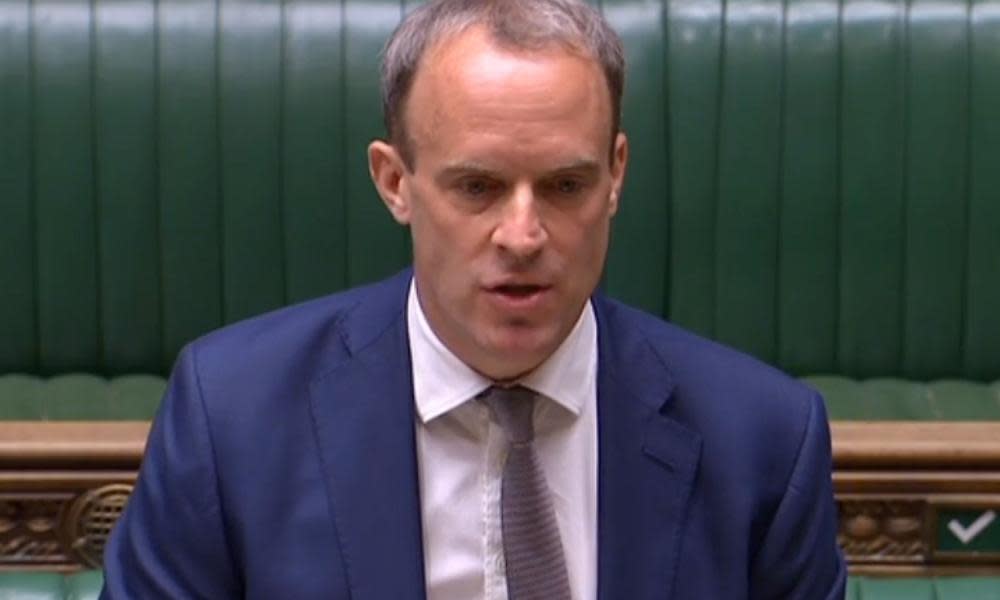Raab calls for alliance to force China to step back over Hong Kong

Britain has vowed to build an international alliance of democracies going beyond “the usual suspects” to force China to step back from the brink over its plans for a new national security law in Hong Kong.
In a statement to MPs, the foreign secretary, Dominic Raab, said that by threatening Hong Kong’s autonomy, China “was inexplicably putting at risk what has long been regarded as one of [its] economic jewels”.
He also accused Beijing of intimidation in building a pro-China global alliance, saying Britain was trying to build its own counter-alliance of democracies to defend Hong Kong freedoms. He said the alliance needed to stretch beyond ‘the usual suspects” in Europe and the Five Eyes alliance to include countries in Africa and Latin America so drawing together countries with “a likeminded attachment to the rule of law”.
Related: Hong Kong: the end of one country, two systems?
Raab also clarified his offer last week of a path to citizenship through an extendable right to stay for periods of 12 months was applicable at this stage only to the existing 300,000 Hong Kong British Nationals Overseas (BNO) passport holders. The offer, including a right to work and study, will extend the right to stay from six months to an extendable 12 months. He said the offer would be formally made only if China wentahead with its as-yet-unpublished security laws.
He told MPs the UK offer was confined to the existing 300,000 BNO passport holders and their dependents in Hong Kong, and not to those eligible for a BNO passport but who do not currently hold one. He said the UK government had to be realistic about the numbers Britain could credibly and responsibly absorb.
If the offer was extended to all those eligible for the BNO passport, as many as 2.5 million people would be entitled to come to the UK. On Friday, there had been suggestions that the offer would definitely to be extended to all those eligible to apply for a BNO.
Raab also ruled out calls from some MPs to offer a UK visa to those not eligible to apply for the BNO. Many of the younger Hong Kong citizens at the centre of the protests against Chinese rule have never been eligible for BNO status as it is only available to those born before 1997.
Revealing he had been looking at the BNO issue with the Home Office since September, he said the UK’s offer met UK’s moral responsibilities as a former colonial power. “We, as the UK, have historic responsibilities, a duty I would say, to the people of Hong Kong,” he said. “We will stand by them, we will live up to our responsibilities,” and added: ”We have a proud tradition for standing up as a haven for those fleeing persecution”,
Raab told MPs: “There is time for China to reconsider. There is a moment for China to step back from the brink and respect Hong Kong’s autonomy and respect China’s own international obligations.
“If China continues down this current path, if it enacts this national security law, we will consider what further response we make, working with those international partners and others,” he said. “It can cross the Rubicon and violate the rights of the people of Hong Kong, or it can step back and understand the widespread concern of the international community”.
He insisted the proposed new law breached Beijing’s international commitments to the “one country, two systems” principle in the former colony.
A number of Conservative MPs demanded that the UK reset its relations with China, but Raab said he wanted to continue to cooperate with China on issues such as trade and climate change.
Labour’s shadow foreign secretary, Lisa Nandy, called for the UK government to “step up” its response. She told MPs: “It is time for an international democratic alliance to come together and speak with one voice.”

 Yahoo News
Yahoo News 
